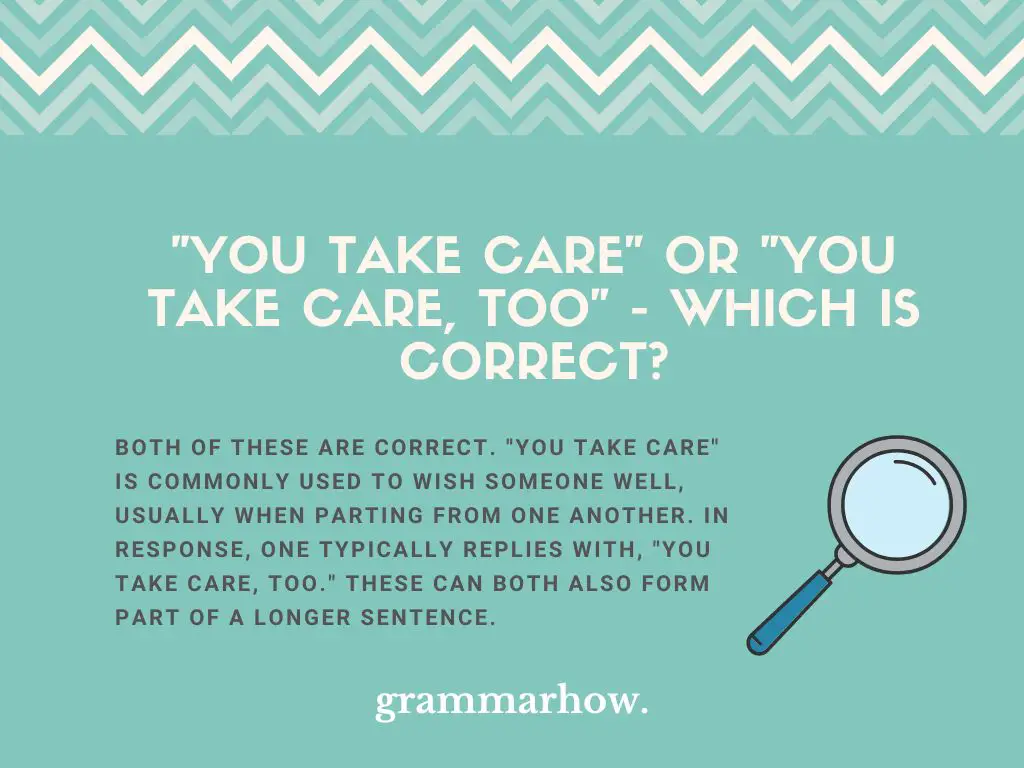Conversations are the best way to connect with other people. Today, we’ll be tackling statements typically used in conversation: “You take care.”, “You take care, too.”, and “You too, take care.”
“You Take Care” or “You Take Care, Too” – Which Is Correct?
Both of these are correct. “You take care” is commonly used to wish someone well, usually when parting from one another. In response, one typically replies with, “You take care, too.” These can both also form part of a longer sentence.

Both “you take care” and “you take care, too” are grammatically correct.
These are both independent clauses, which means that they can stand on their own as a complete sentence. They can also form a part of a longer sentence.
“You take care” is often used to wish someone well, usually before saying goodbye. “You take care, too” is a common response to this statement.
A dialogue involving these two statements can take the following form:
- Person A: “You take care.“
- Person B: “You take care, too.“
As you can see in the above example, using these statements alone can be considered a conversation.
You Take Care
“You take care” is often used to wish someone well, usually upon saying goodbye to a person. It can also form a part of a longer sentence.
“You take care” is an independent clause. This means that it can be considered a complete sentence on its own, even without adding anything to it.
The subject of the clause is the word “you”. “Take care” is an idiomatic phrase that means to “be careful” or “stay safe”. This can also be used in such a way that it becomes synonymous with the phrase “make sure to”.
It is often used as a parting statement or a way to say goodbye. For example, see the following dialogue:
- Person A: “Listen, it has been great spending time with you. Unfortunately, I really have to get home before curfew, so you take care.”
- Person B: “Alright. Bye!”
You Take Care, Too
“You take care, too” is an independent clause that is usually said in response to a statement made by someone you’re having a conversation with.
“You take care, too” is said during a conversation, usually as a response to something.
Because it is an independent clause, it can be considered a complete sentence on its own, without adding anything else to it.
“You” is the subject of the clause, and “take care” means to “be careful” or to “stay safe”. The word “too” can be used to signify reciprocation or to complete an additional thought.
It can be used as a parting dialogue, as seen below:
- Person A: “You take care.“
- Person B: “You take care, too.“
In the above example, Person A is saying goodbye by telling Person B to “take care”. Person B is reciprocating the thought by saying, “You take care, too.”
It can be used as part of a longer sentence, such as in the following example:
- “And don’t forget to buy a carton of milk, some eggs, some butter…,” here she trailed off and looked me in the eye, “and you take care, too.”
The above sentence is also an example of the word “too” being used to complete an additional thought.
You Too Take Care
“You too, take care” is a statement that can be made as a parting message, usually as a response to someone else telling the speaker to “take care”.
“You take care” is a common way to end a conversation with someone. One response you can say in return is “you too, take care.”
“You too, take care” is a combination of two separate statements that you often hear: “You too” and “Take care”.
This is why the two independent clauses are usually separated by a comma (“,”) a semicolon (“;”), or a period (“.”). Take a look at the examples below:
- “You too, take care”
- “You too; take care”
- “You too. Take care”
Final Thoughts
Both “you take care” and “you take care, too” are correct. The former statement is commonly used to wish someone well, usually when parting from one another. The latter statement is a typical response to the former. These can both also form part of a longer sentence.

Martin holds a Master’s degree in Finance and International Business. He has six years of experience in professional communication with clients, executives, and colleagues. Furthermore, he has teaching experience from Aarhus University. Martin has been featured as an expert in communication and teaching on Forbes and Shopify. Read more about Martin here.
